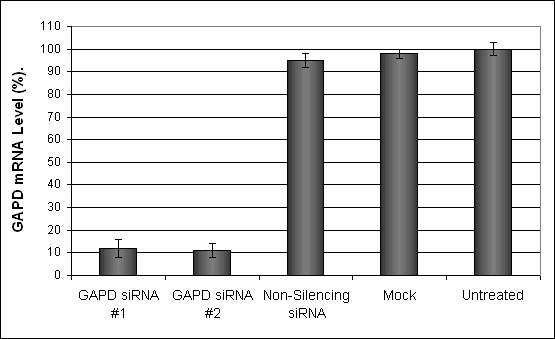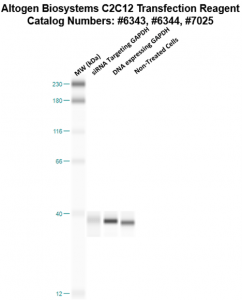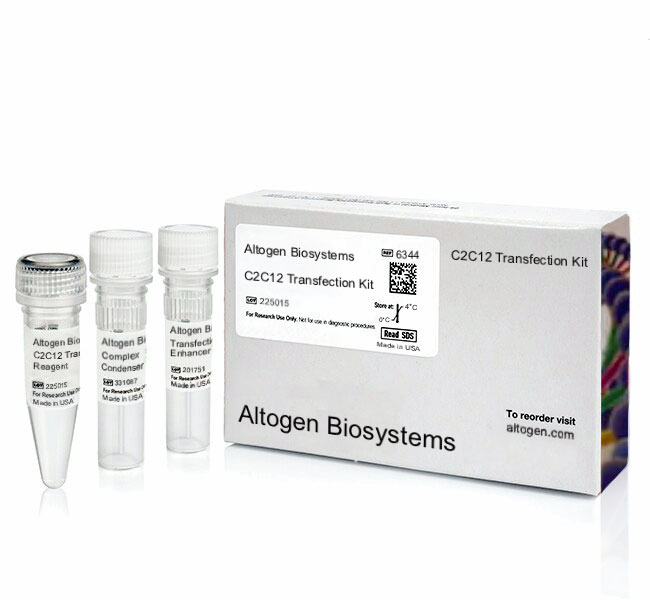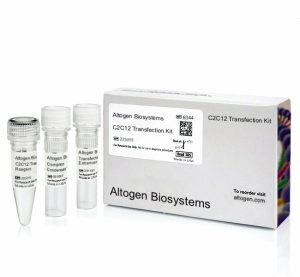Description
Purchase Orders: Click “Add to Cart” button to order, then email PO to orders@altogen.com.
Product Availability: In Stock.
Transfection Reagent for C2C12 Cells (Mouse Myoblast Cells, CRL-1772)
-
Lipid-based transfection reagent
-
Optimized easy-to-use transfection protocol provided for transfection of siRNA, DNA, mRNA, and microRNA
-
Kit includes Transfection Enhancer reagent and recommended transfection protocol
-
High transfection efficacy in the presence of serum
-
Expand your RNAi application with a reagent optimized for delivery of both siRNA and plasmid
-
Reproducible transfection results
-
Works well for standard reverse transfection and high-throughput applications
-
Download in vitro C2C12 transfection protocol: [PDF]
- Download C2C12 CRISPR/Cas9 transfection protocol: [PDF]
-
Download PowerPoint presentation for C2C12 cells transfection kit: [PPT]
- UPC/GTIN/EAN: 860002089731
-
Brand: ALTOGEN®, developed and manufactured by Altogen Biosystems
Transfection Efficiency:
Reagent exhibits at least 88% transfection efficiency of siRNA delivery. Transfection efficiency was determined by qRT-PCR.
Product Description:
Optimized transfection kit for high transfection efficiency of C2C12 mouse cell line used in studies related to muscle development, physiology, and diseases. Originating from satellite cells of the skeletal muscle, C2C12 cells are capable of differentiating into myotubes in vitro, making them a valuable model for studying muscle differentiation and regeneration.
Transfection Protocol and SDS:
Download Altogen Biosystems C2C12 Transfection Protocol: [PDF]
Download SDS: [PDF]
C2C12 Cell Line:
Myocytes are long tubular cells that arise from myoblasts and make up muscle fibers in human beings. Subcloning is the targeted transfer of a specific DNA sequence from the parent vector to the target one. The C2C12 mouse myoblast cell line is a muscle tissue cell line that was derived from a subclone of a mouse (Mus musculus) cell line. C2C12 is a muscle tissue cell line, which exhibits myoblast morphology. This cell line acts as a good transfection model, but can rapidly differentiate into contractile myotubes, producing muscle-specific proteins. C2C12 has been tested negative for mousepox (ectromelia virus). These cells could be used for biomedical research and cell biology, especially of mammalian myoblast cells. Owing to its ability for rapid differentiation that can be easily modulated by treatment with proteins, the C2C12 cell line has proven to be a reliable transfection host for the study of muscle cells. Altogen Biosystems provides pre-optimized lipid-based transfection reagent kits, which have demonstrated high transfection efficiency verified by qRT-PCR, for the C2C12 mouse myoblast cell line.
C2C12 is a cell line that was derived from the skeletal muscle tissue of a mouse. It is commonly used as a model system for studying muscle cell biology and for investigating the molecular mechanisms of muscle differentiation, growth, and regeneration. C2C12 cells are adherent and grow in vitro as myoblasts, which are precursor cells that can differentiate into myotubes, the multinucleated cells that form skeletal muscle fibers. C2C12 cells are often used to investigate the factors and signaling pathways that regulate muscle cell differentiation, such as the myogenic regulatory factors MyoD and Myogenin. C2C12 cells are also useful for studying the molecular mechanisms of muscle growth and hypertrophy, as well as muscle regeneration after injury. They have been used to investigate the effects of various stimuli on muscle cell differentiation and growth, such as mechanical stretch, growth factors, and hormones. In summary, C2C12 cells are a valuable cell line in biomedical research due to their utility in studying muscle cell biology, muscle differentiation, growth, and regeneration. They are a widely used model system for investigating the molecular mechanisms of muscle development and for identifying potential targets for the treatment of muscle-related diseases and disorders.
Data:

Figure 1. GAPD mRNA levels were quantified using real-time RT-PCR in the C2C12 cells transfected with siRNAs targeting GAPD or non-silencing siRNA. Forty-eight hours post-transfection, the cells were harvested and analyzed by real-time RT-PCR for GAPD mRNA expression levels. Data were normalized against the 18S rRNA signal. Control samples were either mock-transfected or untreated. Values are normalized to untreated sample. Data are means ± SD (n=5).

Figure 2. Protein expression of GAPDH in C2C12 cells. DNA plasmid expressing GAPDH or siRNA targeting GAPDH were transfected into C2C12 cells following Altogen Biosystems transfection protocol. At 72 hours post-transfection the cells were analyzed by Western Blot for protein expression levels (normalized by total protein, 10 µg of total protein loaded per each well). Untreated cells used as a negative control.
Selected in vivo transfection product citations (ALTOGEN® IN VIVO Transfection Kits used in the following publications):
- Nature. 2008 454(7203):523-7. Innate immunity induced by composition-dependent RIG-I …Saito et al [PDF]
- Hypertension. 2014 63(2):353-61. Tissue transglutaminase contributes to … Liu et al [PDF]
- Circulation Research. 2010 15;107(8). Kruppel-like factor-4 transcriptionally regulates … Cowan et al [PDF]
- Hypertension. 2012 59(1):158-66. Role of uncoupled endothelial nitric oxide synthase … Gao et al [PDF]
- Jounal of Biological Chemistry. 2012 287(4):2907. Chaperoning of mutant p53 protein … Gogna et al [PDF]
- PLoS Pathogens. 2012 8(8) Uridine composition of the poly-U/UC tract of HCV RNA … Schnell et al [PDF]
- J Proteome Res. 2012(11) Retinal proteome analysis in a mouse model of oxygen-induced … Kim et al [PDF]
- J Transl Med. 2010 15;8:133. Prevention of hyperglycemia-induced myocardial apoptosis … Zhang et al [PDF]
- Mol Cell Biol. 2013 33(7). SCO2 induces p53-mediated apoptosis by Thr845 phosphorylation … Madan et al [PDF]
- Hypertension. 2015 65(2):430-9. Neurokinin 3 receptor and phosphocholine transferase… Parchim et al [PDF]
Altogen Biosystems is a life sciences company that offers cell type-specific and pre-optimized transfection products, elecroporation kits, and in vivo delivery reagents. Advanced formulation of reagents and optimized transfection protocols provide efficient intracellular delivery of protein, DNA, mRNA, shRNA and siRNA molecules. Read more about transfection technology at Altogen’s Transfection Resource. Altogen Labs provides safety and efficacy preclinical research services. GLP-compliant studies for IND applications, and drug development, including over 90 in-house validated xenograft models, safety toxicology, etc (visit AltogenLabs.com).
Volume Options:
- 0.5 ml (Catalog #6343)
- 1.5 ml (Catalog #6344)
- 1.5 ml CRISPR (Catalog #2120)
- 8.0 ml (Catalog #7025)
Purchase Orders: Click “Add to Cart” button to order, then email PO to orders@altogen.com.
Product Availability: In Stock.






